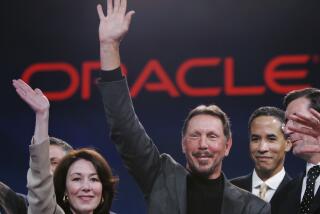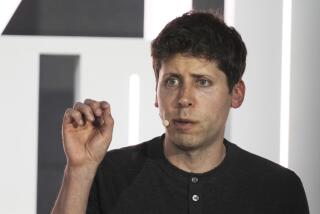Investors’ patience for Yahoo chief may be running thin
- Share via
Reporting from San Francisco — On a conference call to introduce herself to Wall Street as Yahoo Inc.’s brash new chief executive in January 2009, Carol Bartz demanded that everyone give the struggling Internet giant “some friggin’ breathing room.”
On the heels of bungled merger talks with Microsoft Corp., investors weren’t thrilled with the surprise choice of an executive with no experience running an Internet company to oversee one of that industry’s toughest turnaround challenges.
They are even less thrilled now. It’s unclear how long they will give Bartz, with 18 months left on her four-year contract, to deliver on promises to boost Yahoo’s languishing stock price and sharpen its strategic focus as Yahoo continues to battle rising competition from Facebook Inc. and Google Inc.
“The grace period is ending,” BGC Financial analyst Colin Gillis said.
In the meantime, private-equity firms are pushing acquisition scenarios such as a merger with AOL that would put its CEO and former Google executive Tim Armstrong in charge of the combined company. Two people familiar with the situation say that Yahoo board members have not taken any steps to replace Bartz. Yahoo declined to comment.
Scrutiny will only intensify in a few weeks when Wall Street pores over Yahoo’s third-quarter earnings to assess the Sunnyvale, Calif., company’s performance and growth potential and parses Bartz’s explanation for the recent exodus of top media and sales executives.
The chief concern: Consumers continue to spend more time and advertisers more money on popular Internet hangouts such as Google and Facebook despite Yahoo’s efforts to recruit fresh talent and roll out new products.
“There is a lot of innovation happening on the Internet, yet those products are not coming from Yahoo,” Caris & Co. analyst Sandeep Aggarwal said.
Yahoo emerged as one of the brightest Internet stars in the late 1990s, a popular portal that pulled together content from a variety of places, including its own editorial team. But its growth was overshadowed, first by Google, which dominates Internet search, and now by Facebook, which runs the world’s largest social networking service with more than 500 million members.
Bartz, 62, whose long career in Silicon Valley included 14 years running software design firm Autodesk, has cautioned that it could take several years for Yahoo to stage a comeback, pointing out that Apple Inc. did not take off as soon as co-founder Steve Jobs returned to the company in 1997.
People close to Bartz say she is assembling a more nimble team and point out that she has brought greater financial discipline to Yahoo, shedding businesses not central to Yahoo’s core mission. Bartz also struck a deal with Microsoft to use its Bing search engine to power searches on Yahoo websites, which is supposed to lower the cost of competing with Google.
But the latest executive losses — including Hilary Schneider, an executive vice president who oversaw Yahoo’s advertising in the U.S. — have again called into question Bartz’s leadership. They have also strained relationships with the leaders of Yahoo’s valuable Asian investments, Alibaba Group’s Jack Ma and Yahoo Japan’s Masayoshi Son. Yahoo has a 40% stake in Alibaba and a 35% stake in Yahoo Japan.
Yahoo shares closed Friday at $14.49. Its stock price has fallen about 15% this year, far below the $33 a share that Microsoft was prepared to pay for the company in May 2008. Microsoft withdrew the bid when Yang balked.
jessica.guynn@latimes.com






